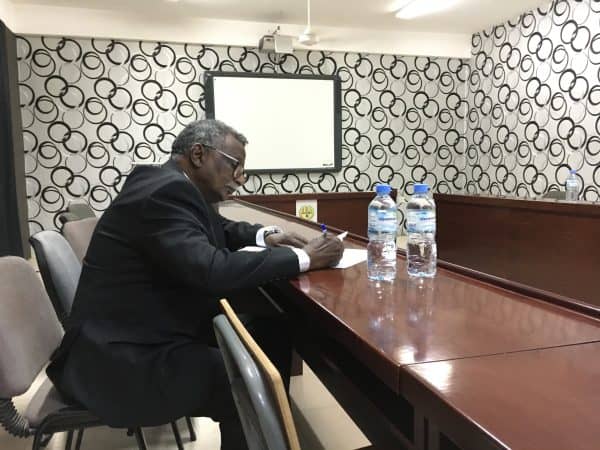When I was asked to say a few words in memory of my friend and fellow strigologist, Abdul Gabbar Babiker, I did not expect all the accolades and affection that speakers at the 16th World Congress on Parasitic Plants (WCPP) in Nairobi rightly gave him, even having a presentation dedicated to him. I spent a lot of time with him when I Iived in Sudan and he was an invaluable help to me in my research, so I was saddened to hear of his death on June 5th of this year at the age of 73. I knew Abdul Gabbar for many years, he was a guest in my home in Virginia and I enjoyed his hospitality at his house in Wad Medani, Sudan, a home, by the way, which is the only one I have visited with a tile floor ruptured by Hydnora abyssinica which he was proud to point out to me despite the damage.
He was an intrepid researcher, always developing new hypotheses, aggressively learning new techniques. While he spent most of his career at the Agricultural Research Center in Wad Medani, he also directed numerous theses and published about 120 papers of which sixty or so dealt with Striga and fifteen with Orobanche.
Abdul Gabbar started his international activity with doctoral studies in Scotland. He received his PhD at the University of Glasgow after which he spent considerable time in laboratories in the United States, Japan, and Germany.
Abdul Gabbar was a friend and encourager to all strigologists as is clearly evident from the many times his assistance has been mentioned by scientists from different nations at the WCPP. In his enthusiasm he was always eager to help a researcher. I well remember how he would greet me excited by some new finding or some new idea, “Musselman [as he called me] I just found a new activity for ethylene”. Despite infrastructure challenges at that time, he kept up with current literature and was always eager to share this information with me and anyone else.
Once the eminent parasitic plant researcher, Johann Visser, was staying at my house and Abdul Gabbar came to stay at the same time. I told him that our small house with a family of six meant he would have to stay in the same room as Johann. “Musselman”, he exclaimed, “I can’t stay in the same room with a South African!” When I explained the alternatives, he grudgingly acceded and by morning was engaged in animated discussion with Johann, adding another collaborator to his expanding list of contacts.
While he researched a diversity of other plants, he was at heart a true strigologist to the end. His last publication I am aware of appeared in 2020.
Abdul Gabbar is survived by his wife, Selwa, two daughters and a son. In the traditional Sudanese expression of condolence, we can say “Barakah fiki.”
Lytton John Musselman
7 July 2022 Nairobi
